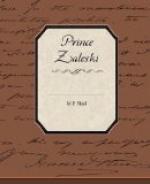’"You are a Spartan?” he asked at length.
’"Yes,” I answered promptly.
’"Then how is it you do not know that I am stone deaf?”
’I shrugged, indicating that for the moment I had forgotten the fact.
’"You are a Spartan?” he repeated.
’I nodded with emphasis.
’"Then, how is it you omit to make the sign?”
’Now, you must not suppose that at this point I was nonplussed, for in that case you would not give due weight to the strange inherent power of the mind to rise to the occasion of a sudden emergency—to stretch itself long to the length of an event; I do not hesitate to say that no combination of circumstances can defeat a vigorous brain fully alert, and in possession of itself. With a quickness to which the lightning-flash is tardy, I remembered that this was a spot indicated by the symbols on the papyrus: I remembered that this same papyrus was always placed under the tongue of the dead; I remembered, too, that among that very nation whose language had afforded the motto, to “turn up the thumb” (pollicem vertere) was a symbol significant of death. I touched the under surface of my tongue with the tip of my thumb. The aged man was appeased. I passed on, and examined the place.
’It was simply a vast circular hall, the arched roof of which was supported on colonnades of what I took to be pillars of porphyry. Down the middle and round the sides ran tables of the same material; the walls were clothed in hangings of sable velvet, on which, in infinite reproduction, was embroidered in cypher the motto of the society. The chairs were cushioned in the same stuff. Near the centre of the circle stood a huge statue, of what really seemed to me to be pure beaten gold. On the great ebon base was inscribed the word [Greek: LUKURGOS]. From the roof swung by brazen chains a single misty lamp.




